12/7/2014: Senate Task Force on Academic Integrity takes swift action to revoke Blandy/Altmann/Baskin strike grading diktats:
Now wouldn’t it have been better to involve the Senate from the start, instead of trying to do this in secret?
After months of confusing flip-flops from the UO administration, the Senate voted unanimously on Wednesday to establish its own Task Force on Academic Integrity to investigate faculty grading options during the GTFF strike. Four days later the TAIF, consisting of Ron Bramhall (Business), Joe Lowndes (Poli Sci) and Frances White (Anthropology), has met with administrators and has issued its report, which is now posted on the Senate website, here.
The gist, which I believe the administration has agreed to, is that faculty are back in charge or grading – not administrators – and that the X grade is a viable option, although as the report notes this may cause a lot of administrative headaches involving financial aid (and may prevent a few football players from participating in the Rose Bowl championship semi-finals, etc., although as a tweeter notes there is an NCAA waiver policy, here.):
Or, I suppose, you can do what Senior VP for Academic Affairs Doug Blandy does, and just give out a bunch of A’s:
 |
 |

[…] UPDATE 3 (12/7/14): The UO Faculty Senate’s Academic Integrity Task Force has issued a report and apparently convinced the administration to put faculty back in charge of grading their classes. […]
For comparison, here is what CAS is telling faculty:
December 7, 2014
TO: College of Arts and Sciences Faculty
FROM: Prof. Ian F. McNeely, Associate Dean for Undergraduate Education
RE: “X” grades and provisional grades
There has been a lot of confusion about why the “X” grade is not a viable option for coping with the GTFF strike.
This memorandum explains why “X” grades imperil students’ financial aid, and why it is instead vital to submit the best possible approximation of a student’s true final grade by the December 19 deadline.
“X” grades and financial aid
In a normal term, roughly 200 “X” grades are recorded out of approximately 87,000 grades total. An “X” means that the instructor of record has not submitted any grade, and therefore that the student cannot be awarded credit for the course in question. Any student whose financial aid is dependent on course credit is therefore potentially affected. About half of UO students — 10,048 of them — are in this category.
For each “X” grade, financial aid staff must manually re-evaluate the student’s aid eligibility. Because there are many different types of financial aid packages, and because so many federal rules and regulations apply, only specially trained experts are able to perform this analysis. Among approximately 20 financial aid staffers at UO, only two or three have the requisite expertise.
Should thousands — rather than a few hundred — “X” grades be entered by the Registrar when instructors fail to submit grades, it is unlikely that staff experts could accommodate the hugely increased case load in the limited time available. The federal government gives universities only 30 days to review individual students’ aid eligibility, recalculate their aid packages, and notify them of any changes. This laborious process will begin as soon as grading ends on December 19 and must be completed by mid-January. Specialists at other universities in the region whom we might ask for help are unfortunately busy with their own end-of-term crunch.
Some faculty have wondered whether they can fulfill federal requirements by documenting their students’ attendance and participation in courses for which no grades are submitted. Under certain conditions, attendance records do suffice for financial aid purposes. This documentation enables financial aid staff to follow up with individual instructors in cases where a specific student’s aid eligibility hinges on a particular course, and to evaluate how the instructor’s response applies to that student’s situation. However, this solution also requires the manual eligibility review described above.
If this process seems Kafkaesque, it truly is. The federal government subjects universities to more intense scrutiny on this precise issue than on virtually any other. Just last month, a feature article in the Chronicle of Higher Education described it as “one of the most hated college regulations.”
UO’s 419 veterans and 569 student athletes are subject to different, but broadly similar, types of scrutiny based on their academic records.
“X” grades will also result in incomplete transcripts and inaccurate GPA calculations, with consequences for students applying to graduate school or for scholarships, or seeking to transfer to other institutions.
In sum, there is no administrative remedy for the risk to students created by widespread failures to submit grades.
Provisional grades
Under the circumstances, submitting the best possible approximation of a student’s true final course grade is the only viable approach. The grade can be considered provisional, and updated at any time by the instructor. The usual automated grade change process on Duckweb is simple and requires no assistance from the Registrar’s Office. Alternatively, faculty may choose to give students the option to accept this approximate grade as their final grade; no subsequent changes would then be necessary. (This and other coping strategies are described on the Academic Affairs website .)
While assigning approximate or provisional grades might result in inappropriately awarding course credit to some students who have genuinely failed the course, this is far preferable to forcing financial aid staff to assume that no student in a course has earned credit, which is the consequence if faculty do not submit grades at all.
With provisional grades, communicating clearly with students is absolutely critical. To help with this, the Registrar will post prominent disclaimers on websites where faculty submit and students review their grades. These disclaimers will state that, due to the GTFF strike, some grades may be provisional and changed later.
The specific approach to determining the best possible approximation of final grades is up to individual faculty instructors. Since the degree of provisionality will vary greatly from course to course, instructors should, to the best of their ability, inform their students about whether, how, and when their grades may change. This will help forestall confusion, complaints, and grievances later.
Please stay posted for any further updates on this and related matters. Thank you all for your efforts at this challenging time.
This memorandum was developed in the College of Arts and Sciences through close consultation with the University Registrar, the Office of Financial Aid and Scholarships, and the Office of Academic Affairs.
“In sum, there is no administrative remedy for the risk to students created by widespread failures to submit grades.”
Except for settling the GTFF negotiations, ending the strike, and getting the GTFs back to work.
Here’s what I’m having trouble with. If it’s possible to give out provisional grades, why isn’t Judith Baskin doing that? She is not a philosopher, linguist, or ethnic studies scholar — she has no expertise to judge whether assignments graded so far in GTF-led classes amount to enough of a basis to issue a merit-based grade.
Could it be that she’s punishing those uppity department heads who refused to abet the centrally mandated educational malpractice?
While I read lots of handwringing posturing about how we must do this or do that or not do the other “for the sake of the students” (graduate students clearly not included), I have heard NOTHING about the admin actually consulting student government on their views. I hereby propose that we let students assign themselves grades for work completed so far They probably have been tracking what points they have earned a lot more carefully than an administrator completely unconnected with the course. I suspect most would display a degree of academic integrity superior to what we see among top administrators lately…
Comment of the week. Contact our swag office for your free U of Nike coffee mug.
Funny how an administrative ‘solution’ could be found for what is logistically and ethically an academic problem, yet the truly administrative problem of reconciling financial aid with ‘X’ grades allegedly has no administrative solution.
So an army of scabs was allegedly available to perform the work of doctoral and masters candidates, who knew their own course material along with the course expectations and the individual needs and progress of their students…Yet somehow noone can be found to perform the work of financial aid processors.
Graduate students have undergraduate and in some cases graduate degrees and have completed graduated level credits. Does the position of financial aid processor require a bachelor’s degree and completion of college-level training in financial aid processing?
It is likely that financial aid is a complex and challenging field requiring months of training, but are GTFs really more easily replaced than financial aid processors? Neither is likely replaceable by an instant army of scabs, but serious accreditation issues are raised by last-minute subbing of community volunteers for GTFs in college courses.
It does not require any degree, actually, and not that much training. The administration (as usual) is being very selective with their choice of words. Processing X grades doesn’t take that much time, it’s just that the people doing it have other work to do too. It wouldn’t be hard at all to hand these other duties off to other people and focus on X grades. Who wants to do extra work, but a few thousand X’s over winter break isn’t impossible.
Where did the information for the grade distribution for AAD 250 come from?
myedu.com, which every UO student checks when they need a quick GPA hit.
AAD 250, 251, and 252 are notoriously easy, and satisfy those pesky multicultural requirements as well.